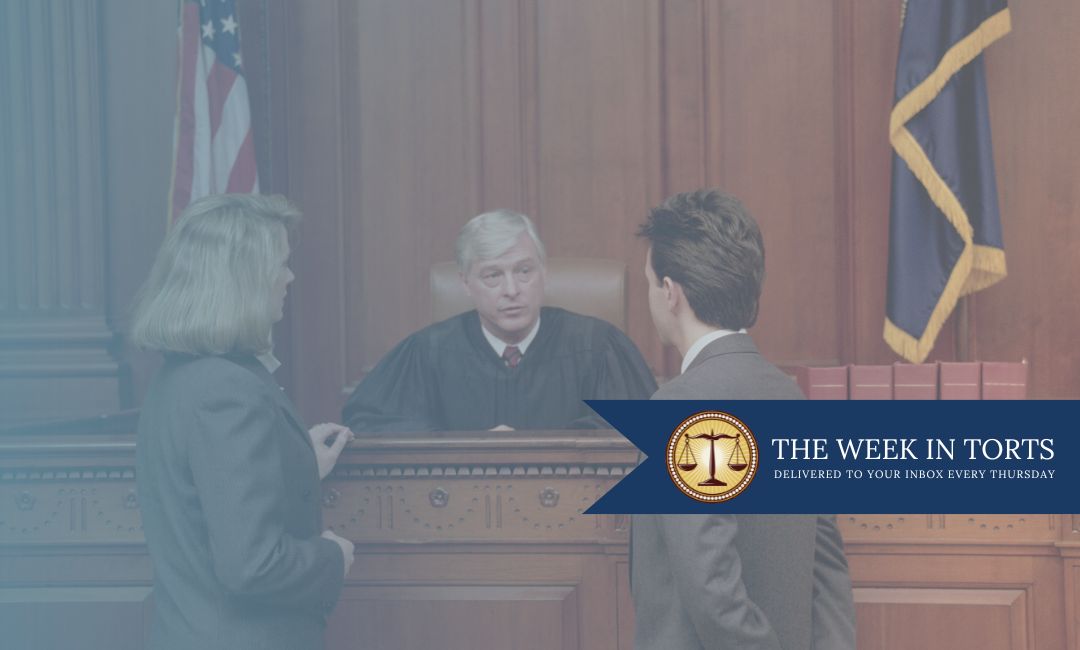The Week In Torts – Cases from May 12, 2023

THAT’s a “single” issue…
FLORIDA LAW WEEKLY
VOLUME 48, NUMBER 19
CASES FROM THE WEEK OF MAY 12, 2023
THE TWO ISSUE RULE DOES NOT APPLY TO PUNITIVE DAMAGES.
Phillip Morris v. Duignan, 48 Fla. Law Weekly D932 (Fla. 2nd DCA May 5, 2023):
In this tobacco case on remand from the Florida Supreme Court and after its second trial, the court addressed a special jury instruction that requires “reliance” on a statement before a smoker or a smoker’s survivor may pursue a fraud claim.
For more general practitioners, the case also addressed the two-issue rule. The two-issue rule provides that where there is no proper objection to the use of a general verdict, reversal is not proper even if there is error found as to one of two issues submitted to the jury, because the appellant is unable to establish that he or she has been prejudiced when the other issue does not contain an error.
In this case, the plaintiffs pursued four theories of liability against the tobacco companies. There was no error found as to either the negligence or strict liability claims submitted to the jury.
Because a general verdict was submitted to the jury on damages, and the tobacco companies did not object or request a special verdict form apportioning the amount of compensatory damages to the four separate claims, the two-issue rule barred reversal on the claim, even in the face of the error with the jury instruction on fraud.
Notably, the two-issue rule does not apply to the issue of punitive damages. Those damages are a separate kind of damages.
The key to applying the two-issue rule is to see whether each claim has a separate measure of damages or not. The rule applies where the finding of liability on one claim entitles the plaintiff to receive the total amount of damages attributable to both theories of liability.
As entitlement to punitive damages is listed separately on the verdict form, asking the jury to award a separate amount of damages in the second phase of the trial, the two-issue rule did not apply to it. Also, a demand for punitive damages is not separate and distinct as a cause of action; rather it is auxiliary to, and dependent upon, the existence of an underlying claim.
WHILE A COURT MAY RELY ON ITS INHERENT AUTHORITY TO IMPOSE ATTORNEYS’ FEES AGAINST AN ATTORNEY FOR BAD FAITH CONDUCT, IT MUST GIVE THE ATTORNEY NOTICE AND AN OPPORTUNITY TO BE HEARD.
Buechele v. In Re: The Estate of Amparo Berenice Buechele, 48 Fla. Law Weekly D896 (Fla. 3rd DCA May 3, 2023):
The trial court entered an order awarding attorney’s fees and sanctions against two litigants (one of who was an attorney representing himself) in a probate case, for their “vexatious litigation related,” found when the two attempted to avoid dismissing a related case with prejudice as the settlement agreement required.
Both parties agreed that the trial court relied upon its inherent authority to impose attorney’s fees as a sanction against an attorney for bad faith conduct, in accordance with Moakley v. Smallwood.
Moakley establishes several requirements which must be followed by a trial court before it may exercise its inherent authority to impose fees as a sanction for bad faith conduct: (1) the attorneys’ fees sanction must be based upon an express finding of bad faith; (2) the attorney’s fees must be supported by detailed factual findings describing the specific acts of bad faith conduct that resulted in the unnecessary incurrence of attorney’s fees, thereby requiring a high degree of specificity; (3) the award of attorney’s fees must be directly related to the attorney’s fees and costs that the opposing party has incurred as a result of the specific bad faith conduct of the attorney; (4) such a sanction is appropriate only after notice and opportunity to be heard, including the opportunity to present witnesses and other evidence.
The trial court never actually ruled upon whether the litigant attorney had engaged in bad faith conduct. While the trial court entered an extensive order, there was no dispute that the trial court made the findings and imposed attorney’s fees as a sanction, doing so without first holding an evidentiary hearing to afford the litigant/attorney an opportunity to present evidence and witnesses.
Because Moakley requires notice and an opportunity to be heard, the appellate court reversed the sanction order and remanded for an evidentiary hearing on all relevant issues.
